World War II, Marriage & a Son
And Europe was getting more blood than ever. Germany's half mad dictator managed to build an army, navy and air force and had equipment the world had never seen before. They were on the march, intent on ruling the whole of Europe and other countries. They were conquering all of the countries near them by killing everybody and running over anything in their way. Everyone in England could see what Hitler was doing, but not everyone was opposed to it. In fact the King and some of his family and many of the ruling ministers supported the dictator. Young girls were wearing swastikas as a sign of support. One great man supported by his friends could see that the dictator would want to appoint a junior dictator to rule the U.K. who would take his orders.
The prime minster went to speak to this half mad dictator and came back with a signed agreement that England would not be involved. Hitler believed that the British prime mister would not comply with the agreement with Poland to help each other. So he marched into Poland and murdered everyone who didn't join him. But he made a mistake. England declared war on Germany.
England had made some preparations in case this happened. One was to provide shelters in case of air raids, when a siren would be heard. Also everyone was given a gas mask. When the siren was heard a man known as the warden would supervise to see that everyone took shelter.
At eleven in the morning
when war was declared, the sirens in London went off. No one had any kind of
practice but they did what they were told. I was in a street on my way to a
shelter when I saw a milkman. At that time milkmen carried their milk using a
horse and cart. The poor milkman was crying. He imagined that the bombs would
be falling any minute. He had been told to unharness the horse, turn it around
so it was facing inwards toward the cart and fasten it up. In his haste he was
having difficulty so I helped him. He could have kissed me as I led the way to
the shelter. The siren turned out to be a false alarm. The plane that was
spotted was British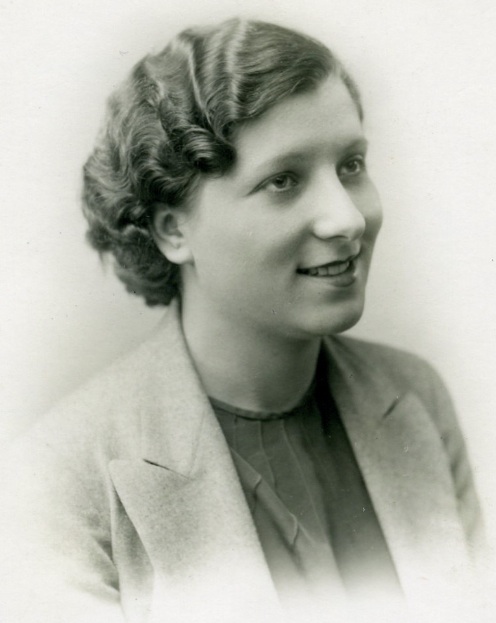 . If the sirens had not sounded I would have been fighting.
I was due to box that day but it was cancelled and the arena was used as an
anti aircraft base with the latest type of gun.
. If the sirens had not sounded I would have been fighting.
I was due to box that day but it was cancelled and the arena was used as an
anti aircraft base with the latest type of gun.
The whole country was busy
organising its defences, arranging conscription for the services and building
all the latest weapons. The Government leaders changed and our great man,
Churchill, became prime minister. The Germans sent over their second in command
to speak with friends of the Germans in the UK to persuade them to agree not to
fight but our leader had him arrested. He knew too much about the dictator and
his cronies to trust any word he said.
Hitler's second in command, who flew to Scotland, was Rudolf Hess. He remained in custody till 1945 when he was convicted of crimes against peace at Nuremberg and sent to Spandau Prison where he died aged 93.
The country remained calm
and life went on as well as possible. Because of the shortage of almost
everything, rationing was introduced and work was difficult to find. However we
had a little fun sometimes. A young girl cousin of mine, Phyllis Greenfield,
was getting engaged. I went to the party and met her boy, Freddie Govier, and
all his family. They were all nice people and among his sisters was a very
beautiful young lady of my age called Joan. I managed to get into conversation
with her and found that I liked her, but I didn't think it was the right time
or place to do anything about it.
Joan c 1939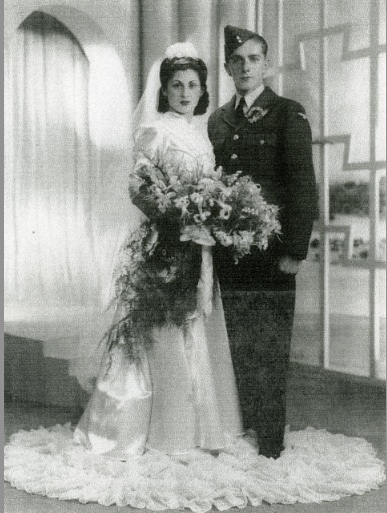
Freddie joined the air force and looked good in his uniform. Freddie and Phyllis got married on 8th September 1940 at the time of battle of Britain. The bombs were falling and exploding everywhere.
Freddie & Phyllis wedding
(There had been a major bombardment in the Surry Docks area the previous night and the reception had to be cancelled because there was no electricity or gas to prepare the food. Instead everyone rustled together what they could find by way of biscuits and wine and a party was held in the synagogue after the ceremony.)
My beautiful new acquaintance was there looking just stunning. I learned later that she was born on May 1st and she was made the queen of May at the festivals. But I also had some doubts. She must have so many boy friends - could I be the type of person she wanted? Anyways, as the bombs fell we got closer. After only two meetings I felt that I was in love with her and asked her if she would meet me again, she said, “Yes”. I kissed her and never felt so good in my life. All her other boyfriends could go jump in the lake.
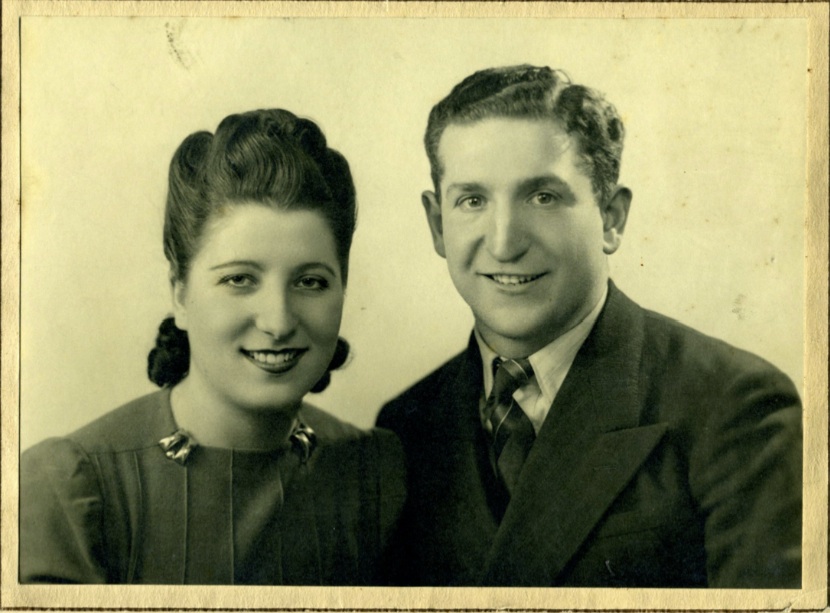
We started going out together, I got to know her family and she got to know mine. But there was War in earnest now. Having won the battle of Britain we were being bombed every night in London and some other UK cities were also taking terrible bombardment. Instead of waiting for my call up papers I joined the RAF and I was due to go in three weeks. I asked my girlfriend if she would like to marry me before I left. She said, “Yes”.
We were married on 1st January 1941 in her local town hall in a hurried marriage with just a few of our families at a little party. We had just a few days together and then I was off.
Jack and Joan on their wedding day
I had my first interview and then my first experience of service life. I was interviewed by a charming officer who was an ex footballer and then manager of England teams. He asked me if I had any preference for what I wanted to do. I said that I had trained to be a physical training instructor mentioning the institute where I qualified. He knew of it and arranged for me to go there after my initial recruits training. I thanked him and left his office. As I was leaving, I came in contact with two sergeants, both semi-literate, who were regular air force men. They had been promoted because there was a shortage of N.C.O s, not on merit. They were both rude and uncouth and their treatment of new recruits, whoever they were, was abominable. I was to meet many like them. In peacetime they were nobodies but in war they thought themselves officers.
After my initial training, which covered marching, how to carry a rifle and clean it, and practice on the firing range, which didn't help my already troublesome hearing problems, I was sent to the station for training new physical training instructors. When I settled in and met my new colleagues, I found that they were mostly schoolteachers and some sportsmen. The training covered how to lead and conduct large classes and we had to learn the military laws and behaviour. Much was familiar but completely new to me were the parallel bars, the horse and the ropes for climbing as well as fencing. When the course was finished we all had to conduct a class in front of the examiners. I suppose I did pretty well, I came second in the group of forty.
If you passed, you were given the rank of Corporal. Discipline is the core of the military and I must admit that I took a lot of bad conduct before I would enforce it. I have always been free and easy and if the recruits disobeyed, as long as they did no harm, I would deal with it without pressing a charge - unlike many jumped up officials.
Every new instructor was assigned to a different camp. I was sent to a camp that mainly dealt with new recruit training and was given a group of forty. I trained them to stand; to turn and to turn about; to run on the spot; to halt; to salute; to turn their heads; to stand easy. It all had to be done in complete unison. Anyone not in step I had to bawl at. I was shouting all day. The group had to compete with others to get congratulations.
Not long after, the camp was going to be used for some other purpose so the recruit training staff were moved to a new camp. However this was not a camp but a nearby seaside resort. Everyone would be billeted out in a hotel or more often to landladies who had catered for holiday visitors in the past. The town was a pretty one that had lots of amenities for entertainment, theatres, cinemas, amusement arcades and a famous tower that was lit up. Many famous performers were around to entertain. All the marching and drill had to take place in the streets with all the vehicles coming and going. But there was a building that was used for table tennis, badminton, and a keep fit section. It also had a football pitch and several famous players were around.
I was unhappy that I was unable to put my P.T. services to use during the day. I went to the little gym in the evenings and assisted anyone who came in. One night a duty officer walked in. He saw me and we had a little chat. He asked me to arrange a boxing tournament. Boxing tournaments are always very popular so I said I would if I could arrange for another camp to send a team. I set to work to organise a local team. In the evenings I trained the lads likely to be in the team and I even got a champion, who was stationed nearby, to give an exhibition. The tournament was a great success and the officer was very pleased with me. I continued my evening P.T. with the lads and even with girls occasionally.
Where there's a lot of ointment, there will always be a fly. The highest ranking non-commissioned officer is called a warrant officer. The warrant officer in charge of our section had been in the RAF for thirty years and was due for retirement. How he got to be a warrant officer, no one knew. He was very poorly educated. He was short tempered and a heavy drinker. He hated me because I didn't mix with his kind, didn't go into pubs and buy him drinks. Whenever he had a chance he said something unkind. The officer who had originally come to see me at the gym popped in and asked me to organise another boxing tournament. I was glad to do so. Everything was arranged. Two days before it was due to take place the warrant officer sent for me. He ordered me to escort ten lads who had been posted to the Shetland Islands on the very day of the tournament. It was obvious he knew my connection with the tournament and was trying to make it very difficult for me. I was under orders so there was nothing I could do. The day I was leaving to go, tournament day, I was packing the things I needed, when there was a knock on the door.
I opened the door and my officer friend told me that I could stop packing because I wasn't going on escort duty. He got word from his sergeant about what the warrant officer had done and immediately got my escort duty cancelled and another corporal was assigned. The tournament went ahead and I even took part in a bout because one boxer didn't feel too well. The following day my warrant officer sent for me. He said, 'What underhand method did you use to get off escort duty?” I was lost for words. He knew what had happened but was implying that I had gone against orders. I said nothing and he dismissed me.
A few days later I was on guard duty for the night. I had a duty guard of ten men to act as sentries at two-hour intervals. All had to stay awake all night in case of emergency or if they were called out by the duty officer. At around eleven thirty I heard knocking on the door. I opened it and found my warrant officer at the door blind drunk. I helped to get him in and sit him down. I could just manage to understand what he was trying to say. His landlady had locked him out and he didn't know where to go. I got a couple of chairs and made something like a bed for him to rest. Early in the morning I roused him and made him look respectable and sent him home to his digs. I promised him no one would know about this. But of course I couldn't know whether this had happened on other occasions.
He never sent for me or
abused me again. A couple of weeks later I received my posting notice. The camp
I was posted to was a regular RAF station with all facilities and much nearer
to London. Now at last I would be a real Physical Trainer. Once again my
officer friend came to see me. He said that he had heard that I was posted and
he wanted me to stay but he wanted to know how I felt about it. I thanked him
for his interest but told him that I did really want to go. He knew all about
the warrant officer and could have shifted me to another division but he could
see I wanted to go. As he left me, he called out, “Good luck.”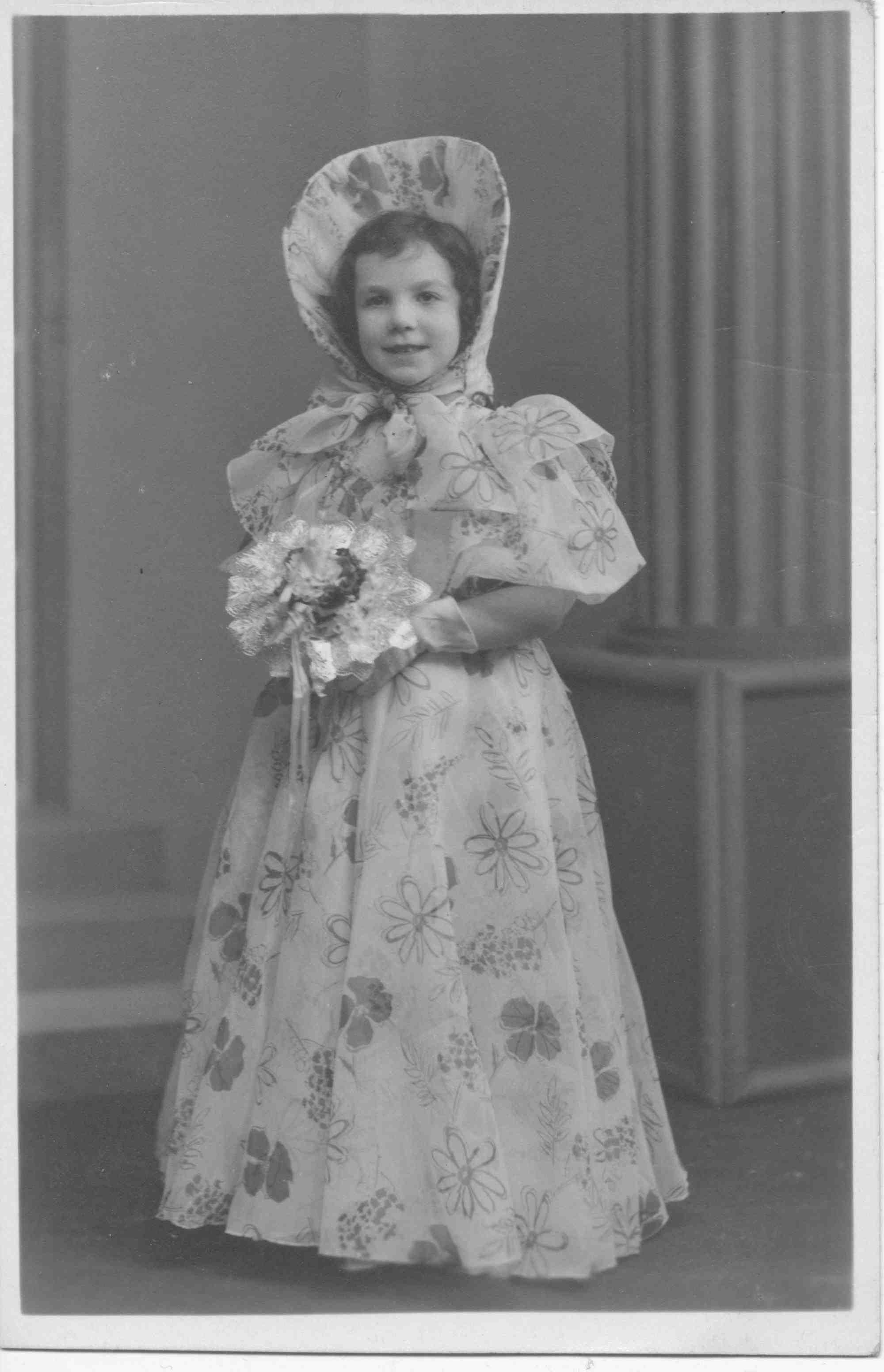
Now as an N.C.O. I was allowed to find accommodation near the camp for my wife and myself, which was called living out allowance. Being an experienced secretary, Joan always found a local company that was doing what was called “war work”. It made her happy and she always became friendly with local people. Another bonus was that we could take care of Joan’s sister's young daughter, Evelyn (shown right c 1944) to get her away from the bombing in London where they lived.
The camp, to which I was now posted was ideal for me. I was in charge of everything connected to P.T. and sport. There was a fine gym and I arranged boxing tournaments, football matches and cricket in the summer. The camp was in a little village in the countryside and we hardly saw any enemy planes. But there always was a guard on duty on the roof or the headquarters building. One night, suddenly the warning siren came on. A plane was spotted overhead. It dropped a small bomb that landed in a field but did no damage. There was no sound of our guard's machine gun. He tried to fire but it jammed. Thinking that he would never have to use it he had neglected the maintenance. I don't think the pilot made it home.
As a P.T.I. I had to go on refresher courses. On my last one, we were shown how to help aircrews to see better at night when they were flying. When they were due to come to the gym they were instructed in advance to wear very dark glasses. After thirty minutes they came into the gym, which was in complete darkness. They removed their glasses. The only thing they could see was anything painted in white. Some people naturally had better night vision than others but I never realised that at the time. Later scientists came up with equipment that made it much easier to see in the dark.
I wondered whether I had
anything to do with it, but now this camp was due to close. Gradually everyone
who was not connected with the actual flying, air crews, maintenance and
machines, controllers, were on the move. I was late in leaving, because I had
to have an inventory of everything connected with my department. When I had to
go, I was posted to an atomic research location, but only on a temporarily
basis. There was nothing there I could do to help. I was not allowed to go
anywhere near the research.
David Mindel c 1944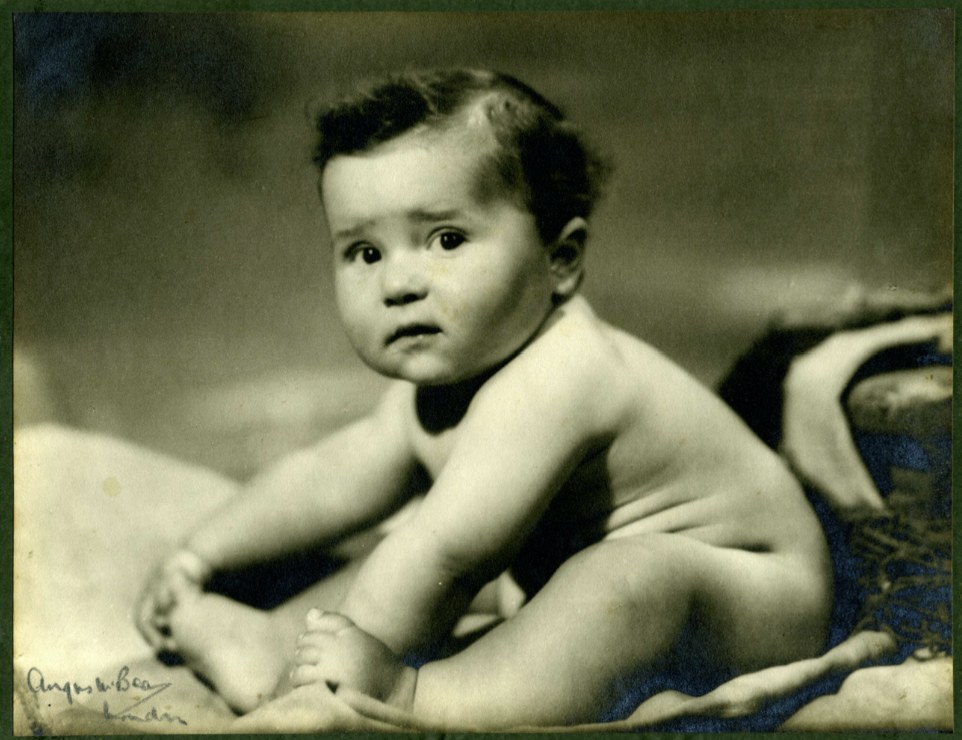
I was on the move once more.
But before I left, there was a message for me. My wife had been taken to
hospital and given birth to a baby boy of eight pounds. I knew she was pregnant
but never knew when the baby was due. I got a compassionate pass and went
straight to the hospital. As I walked in and greeted my wife she was full of
smiles, although she had suffered dreadfully. I was impelled to examine my
son's little finger on each hand. The little fingers on my father’s hand were
slightly bent. The little fingers on my hands are slightly bent and when my
son's wife gave birth to a son, he had bent fingers and the same applied to my
great grandchild. I was unable to stay. It was arranged that my eldest brother
was able to come and be godfather to my son.
This is the memorial to the Jewish population of Dunillowicze where the remainder of both of Jack's parents' families who didn't escape would have perished. The inscription reads:
In memory of the 829 Jews of
Dunillowicze murdered at the hands of the German Nazis November 12th 1942
